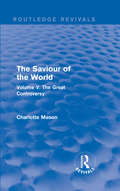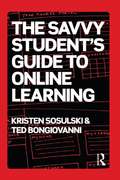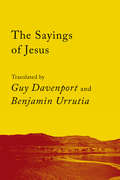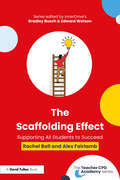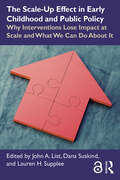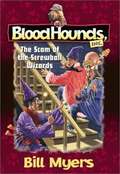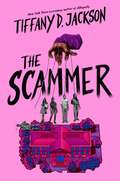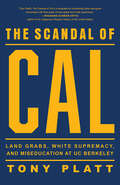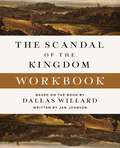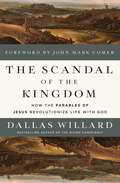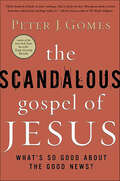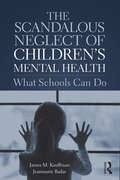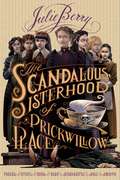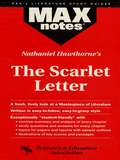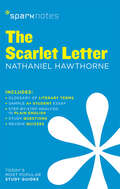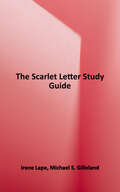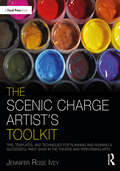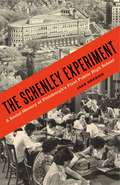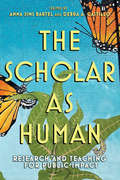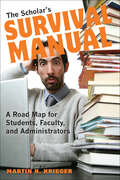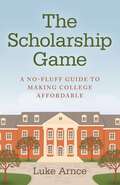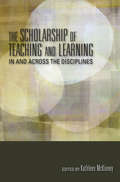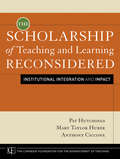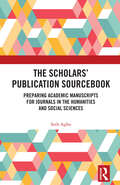- Table View
- List View
The Saviour of the World: Volume V: The Great Controversy (Routledge Revivals)
by Charlotte M MasonThe Saviour of the World covers each incident and each saying in the Bible and converts them to either a single poem, blank verse or rhymed stanza, according to the subject. This volume, called The Great Controversy, was originally published in 1911. This book will be of interest to students of both religious studies and English literature.
The Savvy Student's Guide to Online Learning: By Kristen Sosulski And Ted Bongiovanni
by Kristen Sosulski Ted BongiovanniThe Savvy Student’s Guide to Online Learning prepares students of all kinds for contemporary online learning. While technologies and formats vary, this book serves as an authoritative resource for any student enrolling in an online degree program or taking an online course. Topics covered include: • How to become a great online student • Creating an online presence • Interaction and communication techniques • Online group projects and individual work • Technological requirements and how to get technical support • Online classroom "netiquette" and time management The authors, both experts in online education, introduce the information and skills required of successful online students to navigate this new learning landscape with confidence. A highly useful companion website provides video presentations that explain the different types of online learning as well as a real online course with activities for students to practice and interact with other learners around the world.
The Sayings of Jesus: The Logia of Yeshua (Counterpoints #3)
by Guy Davenport and Benjamin UrrutiaJesus was a street preacher who taught through story and aphorism. Antedating the Gospels, these 105 sayings were recorded by his followers during and shortly after his lifetime. Through the immediacy of direct quotation, Guy Davenport and Benjamin Urrutia’s bold translation shakes our preconceptions, reintroducing us to the West’s greatest teacher, whose powerful words ring anew.
The Scaffolding Effect: Supporting All Students to Succeed (The Teacher CPD Academy)
by Alex Fairlamb Rachel BallScaffolding is the support teachers provide students so they can successfully progress from novice to expert and is a crucial part of teaching and classroom management. This exciting book explores the research behind scaffolding and adaptive teaching whilst also debunking the myths and misconceptions behind this approach.Drawing on evidence from cognitive science, it brings together best practice of tried and tested methods of effective scaffolding across different settings and disciplines. Featuring practical classroom examples, research evidence, and case studies, the chapters cover: The link between cognitive science and effective scaffolding strategies Using scaffolding to support literacy and oracy Scaffolding in practical subjects Ways to scaffold homework How to modify scaffolding for different ages and settings Pitfalls to avoid when implementing scaffolding Part of the Teacher CPD Academy series from InnerDrive, this is essential reading for all teachers and school leaders that want evidence-based strategies which focus on impact in the classroom in sustainable and meaningful ways.
The Scale-Up Effect in Early Childhood and Public Policy: Why Interventions Lose Impact at Scale and What We Can Do About It
by John A. ListThis critical volume combines theoretical and empirical work across disciplines to explore what threatens scalability—and what enables it—in the early childhood field. Authors and editors provide specific recommendations to help professionals refine and apply the science of scaling in their programs, research, and decision making. Written by leading experts in early childhood, economics, psychology, public health, philanthropy, and more, chapters and commentaries shine light on how to effectively use experimental insights for policy purposes. The result is a comprehensive and forward-thinking guide to the challenges and possibilities of effective scaling in early childhood and beyond. Essential reading for researchers, practitioners, funders, and policy makers alike, this book raises vital questions and provides a vision for the long-term journey to scalable evidence.
The Scale-Up Effect in Early Childhood and Public Policy: Why Interventions Lose Impact at Scale and What We Can Do About It
by John A. ListThis critical volume combines theoretical and empirical work across disciplines to explore what threatens scalability—and what enables it—in the early childhood field. Authors and editors provide specific recommendations to help professionals refine and apply the science of scaling in their programs, research, and decision making.Written by leading experts in early childhood, economics, psychology, public health, philanthropy, and more, chapters and commentaries shine light on how to effectively use experimental insights for policy purposes. The result is a comprehensive and forward-thinking guide to the challenges and possibilities of effective scaling in early childhood and beyond.Essential reading for researchers, practitioners, funders, and policy makers alike, this book raises vital questions and provides a vision for the long-term journey to scalable evidence.
The Scam of the Screwball Wizards (Bloodhounds, Inc. #10)
by Bill MyersMadcap MYSTERIES With a MESSAGE! What's going on in the abandoned theater on the outskirts of Midvale? Have monsters really invaded Mrs. Tubbs' home? Is Slobs, the trusted bloodhound, next? Likeable, easy-going Bear isn't really one for reading (except for the back of cereal boxes), so when he starts plowing through a popular new book series, everyone is pretty impressed and a little shocked. But now he's calling himself "The Phangmaster" and no longer cares about his oíd friends--and thinks he can cast spells on anyone who gets in his way. It's up to Bloodhounds, Inc., to find out what's going on as Sean, Melissa, and trusted sidekick Jeremiah get to the bottom of the new craze of fantasy books sweeping their town.
The Scammer
by Tiffany D JacksonNew York Times bestselling author Tiffany D. Jackson delivers another stunning, ripped-from-the-headlines thriller, following a freshman girl whose college life is turned upside down when her roommate’s ex-convict brother moves into their dorm and starts controlling their every move.Out from under her overprotective parents, Jordyn is ready to kill it in prelaw at a prestigious, historically Black university in Washington DC. When her new roommate’s brother is released from prison, the last thing Jordyn expects is to come home and find the ex-convict on their dorm room sofa. But Devonte needs a place to stay while he gets back on his feet—and how could she say no to one of her new best friends?Devonte is older, as charming as he is intelligent, pushing every student he meets to make better choices about their young lives. But Jordyn senses something sinister beneath his friendly advice and growing group of followers. When one of Jordyn’s roommates goes missing, she must enlist the help of the university’s lone white student to uncover the mystery—or become trapped at the center of a web of lies more tangled than she can imagine.
The Scandal of Cal: Land Grabs, White Supremacy, and Miseducation at UC Berkeley
by Tony PlattThe incendiary story of conquest, racism, warfare, and historical amnesia at one of the world’s most celebrated and ostensibly enlightened public universities."This is a land acknowledgment." —Ruth Wilson Gilmore, author of Abolition Geography: Essays towards Liberation"The Scandal of Cal is a template for scrutinizing other land-grant universities … This is a beautifully written and heartbreaking narrative." —Roxanne Dunbar-Ortiz, author of An Indigenous Peoples’ History of the United StatesThe University of California, Berkeley—widely known as "Cal"—is admired worldwide as a bastion of innovation and a hub for progressive thought. Far less known are the university’s roots in plunder, warfare, and the promotion of white supremacy. As Tony Platt shows in The Scandal of Cal, these original sins sit at the center of UC Berkeley’s history. Platt looks unflinchingly at the university’s desecration of graves and large-scale hoarding of Indigenous remains. He tracks its role in developing the racist pseudoscience of eugenics in the early twentieth century. He sheds light on the school’s complicity with the military-industrial complex and its incubation of unprecedented violence through the Manhattan Project. And he underscores its deliberate and continued evasions about its own wrongdoings, which echo in the institution’s decision-making up to the present day. This book, above all, illuminates Cal’s culpability in some of the cruelest chapters of US history and sounds a clarion call for the university to undertake a thorough and earnest reckoning with its past. It is required reading for Cal alumni, students, faculty, and staff, and for anyone concerned with the impact of higher education in the United States and beyond.
The Scandal of the Kingdom Workbook: How the Parables of Jesus Revolutionize Life with God
by Dallas WillardWhat does it mean to live in the kingdom of God in our day-to-day lives?A runaway son. A woman's frantic search for a coin. A farmer paying hired help. Jesus relied on ordinary situations like these to communicate extraordinary truths about following after him.Of course . . . not everyone who heard Jesus' parables understood what they meant. Even the disciples at times had to ask Jesus to explain the point of a story that he had just told. Jesus was always willing to explain the meaning to them and any others who sought to understand the mysteries of God's kingdom. He does the same for like-minded seekers today.The Scandal of the Kingdom Workbook, based on the teachings of the late beloved author Dallas Willard, will aid you in this kind of exploration of many of the parables that Jesus told. Each lesson will help you understand the heart behind a parable, how Jesus used it to communicate the realities of God and life in his kingdom, and how it is still revolutionary—even "scandalous"—in showing you the way in which God invites you to lead your life.This workbook is designed for use with The Scandal of the Kingdom by Dallas Willard. Each of the fifteen lessons in this workbook include these sections:Hearing What Jesus Said: The truths that Jesus was revealingThinking About What Jesus Said: How those truths apply to youResponding to What Jesus Said: What actions to take
The Scandal of the Kingdom: How the Parables of Jesus Revolutionize Life with God
by Dallas WillardA major new work by Dallas Willard, the highly anticipated follow-up to his seminal work The Divine Conspiracy. In this groundbreaking book based on teachings he delivered to a church community, Willard delves into the transformative power of Jesus's parables, revealing how they show us how to live right now in the kingdom of God.Drawing from his extensive teachings on spiritual formation, Willard illuminates the timeless wisdom contained within each parable, revealing their profound relevance to contemporary life. With clarity and depth, he guides readers through the subversive messages embedded within these seemingly simple stories, urging us to break free from the grip of worldly values and embrace the radical teachings of Jesus.The Scandal of the Kingdom is not just a book--it's a call to action. Willard challenges readers to move beyond passive acceptance of comfortable dogmas and instead to actively engage with the values of the kingdom of God. He reminds us that the kingdom is not some distant future destination but a present reality, beckoning us, as the parables of Jesus did, to live with a new purpose and intentionality in the here and now.Through insightful analysis and practical wisdom, Willard empowers readers to transform their lives and communities by embodying the radical love, compassion, and justice exemplified in Jesus's parables. This book is a beacon of hope for Christians seeking to deepen their faith and live more authentically in accordance with the teachings of Christ. Willard empowers us to:Become more passionate about living the gospel in the full scope of Jesus's vision for usBetter share the faith of Jesus with those disillusioned with ChristianityUnlock the excitement of living in the upside-down kingdom of GodShare the gospel of Jesus in the way he did A significant new resource for Christians worldwide, this book offers a road map for spiritual growth and renewal in an increasingly complex and challenging world. With its profound insights and transformative message, it is destined to leave a lasting impact on the hearts and minds of believers everywhere.
The Scandalous Gospel of Jesus: What's So Good About the Good News?
by Peter J. Gomes“Gomes is an iconoclast, and his book is an alternately eloquent and folksy attack on everybody who is sure of the right answer.” —NewsweekHow the Church Domesticated JesusWith his unique blend of eloquence and insight, the esteemed Harvard minister Peter J. Gomes invites us to hear anew the radical nature of Jesus’ message of hope and change. Using examples from ancient times as well as from modern pop culture, The Scandalous Gospel of Jesus shows us why the good news is every bit as relevant today as when it was first preached.“Of the hundreds of books on Jesus’ teachings, this is by far the best. Mincing no words, it drives home how radical Jesus’ teachings really are.” —Huston Smith, author of The World’s Religions“An incisive original . . . [Gomes is] a born storyteller.” —Publishers Weekly, starred review
The Scandalous Neglect of Children’s Mental Health: What Schools Can Do
by James M. Kauffman Jeanmarie BadarThe Scandalous Neglect of Children’s Mental Health: What Schools Can Do makes the case that children with mental health needs are under-identified and under-served by schools and other agencies. After reading this brief but powerful book, you will better understand the nature of children’s mental health needs and the need for expanded services for children in schools and communities. The risks and benefits of treatment, especially early intervention, are discussed and guidelines for action by teachers, parents, and others are provided. The sad fact is that many people do not understand that most young people with mental health needs never receive any treatment of any kind and most of those who receive any treatment at all receive those services only in schools.
The Scandalous Sisterhood of Prickwillow Place
by Julie BerryThe students of St. Etheldreda's School for Girls face a bothersome dilemma. Their irascible headmistress, Mrs. Plackett, and her surly brother, Mr. Godding, have been most inconveniently poisoned at Sunday dinner. Now the school will almost certainly be closed and the girls sent home--unless these seven very proper young ladies can hide the murders and convince their neighbors that nothing is wrong.
The Scarlet Letter (MAXNotes Literature Guides)
by Michael PetrusREA's MAXnotes for Nathaniel Hawthorne's The Scarlet Letter The MAXnotes provides a comprehensive summary and analysis of The Scarlet Letter and a biography of Nathaniel Hawthorne. Places the events of the novel in historical context and discusses each chapter in detail. Includes study questions and answers along with topics for papers and sample outlines.
The Scarlet Letter SparkNotes Literature Guide (SparkNotes Literature Guide Series #57)
by SparkNotesThe Scarlet Letter SparkNotes Literature Guide by Nathaniel Hawthorne Making the reading experience fun! When a paper is due, and dreaded exams loom, here's the lit-crit help students need to succeed! SparkNotes Literature Guides make studying smarter, better, and faster. They provide chapter-by-chapter analysis; explanations of key themes, motifs, and symbols; a review quiz; and essay topics. Lively and accessible, SparkNotes is perfect for late-night studying and paper writing. Includes:An A+ Essay—an actual literary essay written about the Spark-ed book—to show students how a paper should be written.16 pages devoted to writing a literary essay including: a glossary of literary termsStep-by-step tutoring on how to write a literary essayA feature on how not to plagiarize
The Scarlet Letter Study Guide
by Irene Lape Michael S. GillelandThrough Nathaniel Hawthorne's timeless tale of sin, guilt, vengeance, and redemption, students will learn: Background Information: Do some research to learn more about the early history of the Massachusetts Bay Colony, Romanticism, and Transcendentalism. Author Biography Vocabulary words used throughout the novel, utilizing a variety of activities to stimulate retention and growth. Literary Techniques: Grammar and parts of speech, root words, foreshadowing, imagery, synonym, personification, compare & contrast, in context. Moral Lessons and Character Values: Keeping secrets, lying, shame, penance, and martyrdom, judging others, correction and pride, vengeance, confession, subjective morality, reconciliation with God. Activities and Writing Assignments: Pre-reading analysis papers on civil government, biblical view of sin, and biblical response to people. Brook Farm research. Point-of-view summary essay. Puritanism research paper. Analyze patterns in the novel. Suggestions for Further Reading: We include an in-depth reading list of more books by the same author(s) and other books that tie in with, or are similar to, The Scarlet Letter. All of the unit lessons are written from a Christian worldview! - Large 8.5x11 printed workbook format is convenient to read and easy on the eyes - Every question has plenty of whitespace for student's answers - Encourages neat and clean handwriting practice - Easily transports without the need for a laptop or other expensive equipment - Provides a permanent record of the student's work - Convenient, removable answer key included for the teacher! - Study guides do not contain the text of the story, play, poems, or book.- Recommended for grades 9-12. - Setting: Massachusetts 1640s - Genre: American literature, Historical literature
The Scenic Charge Artist's Toolkit: Tips, Templates, and Techniques for Planning and Running a Successful Paint Shop in the Theatre and Performing Arts (The Focal Press Toolkit Series)
by Jennifer Rose IveyThe Scenic Charge Artist’s Toolkit is a comprehensive guide to managing a theatrical paint shop. This book introduces the many different options available to a scenic charge artist, as well as the fundamental expectations and responsibilities of planning and running a shop. From the pre-production organization, budgeting, sampling, and sealing, to practical lessons in efficiency and shop maintenance, this text provides options to organize a paint shop no matter the size of the shop, show, or company. Filled with templates for labor and time estimation; tips on leadership and collaboration; techniques for painting and planning textures efficiently; and sustainable practices in health, safety, and wellness, this book provides guidance and practices to successfully manage the inevitable changes in theatre planning and production. It also offers tips and reference material on employment options, gaining employment, and excelling in this profession. Written for early career scenic artists in theatre and students of Scenic Art courses, The Scenic Charge Artist’s Toolkit fills in the gaps of knowledge for scenic artists in the budgeting, planning, and running of shops at summer stock, educational institutions, or freelance working environments. The text includes access to additional online resources such as extended interviews, downloadable informational posters and templates for budgeting and organizing, and videos walking through the use of templates and the budgeting process.
The Schenley Experiment: A Social History of Pittsburgh’s First Public High School (Keystone Books)
by Jake OresickThe Schenley Experiment is the story of Pittsburgh’s first public high school, a social incubator in a largely segregated city that was highly—even improbably—successful throughout its 156-year existence. Established in 1855 as Central High School and reorganized in 1916, Schenley High School was a model of innovative public education and an ongoing experiment in diversity. Its graduates include Andy Warhol, actor Bill Nunn, and jazz virtuoso Earl Hines, and its prestigious academic program (and pensions) lured such teachers as future Pulitzer Prize winner Willa Cather. The subject of investment as well as destructive neglect, the school reflects the history of the city of Pittsburgh and provides a study in both the best and worst of urban public education practices there and across the Rust Belt. Integrated decades before Brown v. Board of Education, Schenley succumbed to default segregation during the “white flight” of the 1970s; it rose again to prominence in the late 1980s, when parents camped out in six-day-long lines to enroll their children in visionary superintendent Richard C. Wallace’s reinvigorated school. Although the historic triangular building was a cornerstone of its North Oakland neighborhood and a showpiece for the city of Pittsburgh, officials closed the school in 2008, citing over $50 million in necessary renovations—a controversial event that captured national attention.Schenley alumnus Jake Oresick tells this story through interviews, historical documents, and hundreds of first-person accounts drawn from a community indelibly tied to the school. A memorable, important work of local and educational history, his book is a case study of desegregation, magnet education, and the changing nature and legacies of America’s oldest public schools.
The Scholar as Human: Research and Teaching for Public Impact
The Scholar as Human brings together faculty from a wide range of disciplines—history; art; Africana, American, and Latinx studies; literature, law, performance and media arts, development sociology, anthropology, and Science and Technology Studies—to focus on how scholarship is informed, enlivened, deepened, and made more meaningful by each scholar's sense of identity, purpose, and place in the world. Designed to help model new paths for publicly-engaged humanities, the contributions to this groundbreaking volume are guided by one overarching question: How can scholars practice a more human scholarship?Recognizing that colleges and universities must be more responsive to the needs of both their students and surrounding communities, the essays in The Scholar as Human carve out new space for public scholars and practitioners whose rigor and passion are equally important forces in their work. Challenging the approach to research and teaching of earlier generations that valorized disinterestedness, each contributor here demonstrates how they have energized their own scholarship and its reception among their students and in the wider world through a deeper engagement with their own life stories and humanity.Contributors: Anna Sims Bartel, Debra A. Castillo, Ella Diaz, Carolina Osorio Gil, Christine Henseler, Caitlin Kane, Shawn McDaniel, A. T. Miller, Scott J. Peters, Bobby J. Smith II, José Ragas, Riché Richardson, Gerald Torres, Matthew Velasco, Sara WarnerThanks to generous funding from Cornell University, the ebook editions of this book are available as Open Access volumes from Cornell Open (cornellopen.org) and other repositories.
The Scholar's Survival Manual: A Road Map For Students, Faculty, And Administrators
by Martin H. KriegerThe product of a lifetime of experience in American universities, The Scholar's Survival Manual offers advice for students, professors, and administrators on how to get work done, the path to becoming a professor, getting tenured, and making visible contributions to scholarship, as well as serving on promotion and tenure committees. Martin H. Krieger covers a broad cross section of the academic experience from a graduate student's first foray into the job market through retirement. Because advice is notoriously difficult to take and context matters a great deal, Krieger has allowed his ideas to percolate through dozens of discussions. Some of the advice is instrumental, matters of expediency; some demands our highest aspirations. Readers may open the book at any place and begin reading; for the more systematic there is a detailed table of contents. Krieger's tone is direct, an approach born of the knowledge that students and professors too often ignore suggestions that would have prevented them from becoming academic roadkill. This essential book will help readers sidestep a similar fate.
The Scholarship Game: A No-Fluff Guide To Making College Affordable
by Luke ArnceThe Scholarship Game is a guide to the college application and scholarship selection processes written from the perspective of someone who just finished them. The book provides a step-by-step walkthrough of the application process beginning with developing a resume and deciding where to apply, and ending with negotiating with colleges and making a final decision. It covers how to approach every aspect of a college application as well as tips for writing scholarship applications and breakdowns of every type of interview the author experienced during his own process.
The Scholarship of Teaching and Learning In and Across the Disciplines
by Mary Taylor Huber Kathleen MckinneyThe scholarship of teaching and learning (SoTL) began primarily as a discipline-based movement, committed to exploring the signature pedagogical and learning styles of each discipline within higher education, with little exchange across disciplines. As the field has developed, new questions have arisen concerning cross-disciplinary comparison and learning in multidisciplinary settings This volume by a stellar group of experts provides a state-of-the-field review of recent SoTL scholarship within a range of disciplines and offers a stimulating discussion of critical issues related to interdisciplinarity in teaching, learning, and SoTL research.
The Scholarship of Teaching and Learning Reconsidered
by Mary Taylor Huber Anthony Ciccone Pat HutchingsDrawing on the experience with the individuals, campuses, and professional associations associated with the Carnegie Academy for the Scholarship of Teaching and Learning and the Institutional Leadership Program, this important resource examines four critical areas where engagement with the scholarship of teaching and learning can have a significant effect. This book is intended for a broad audience of campus leaders, faculty, and people in foundations and other education associations with an interest in supporting new directions in teaching and learning.
The Scholars’ Publication Sourcebook: Preparing Academic Manuscripts for Journals in the Humanities and Social Sciences
by Seth AgboThis book is a comprehensive guide for instructors and graduate students on preparing scholarly manuscripts for peer-reviewed journals, theses, or dissertations in the humanities and social sciences.Providing a toolbox of approaches to understand the structures around manuscript preparation, it offers an in-depth understanding of the different types of manuscripts and the nuanced approaches required. It illuminates each stage of the process, from the initial identification of a topic to the publication of the final article. It draws on the expertise of various contributors, including journal editors, editorial board members, peer reviewers, and research methods instructors. The book is a practical guide for all instructors and students seeking insight into the publishing process in high-impact journals. It draws from case studies across various fields such as sociology, psychology, political science, business studies, policy research, and public health.The book will be of particular relevance to early-career scholars, graduate students, and instructors working with students preparing theses, dissertations, or journal articles. It serves as a valuable resource for understanding and navigating the complex world of academic publishing.
